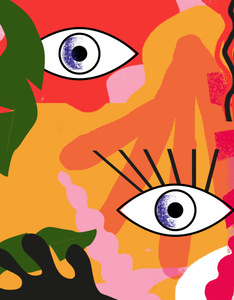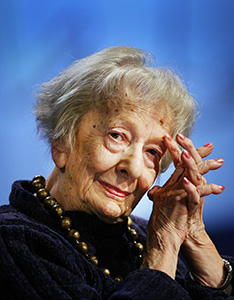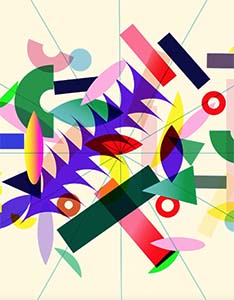Institute’s programmes between 2010 and 2020
Master Programme
Launched in 2014, the Master interdisciplinary programme implemented strategic objectives from various fields of art. The programme team cooperated with major Polish and foreign cultural institutions, initiating and organising art events in various countries across several continents. The team worked together with the greatest Polish directors, composers, and visual artists, presenting their work at festivals, theatres, concert halls, and museums. Among the most important productions was an American musical about Ignacy Jan Paderewski. Some exhibitions worth mentioning include the presentation of Andrzej Wróblewski’s work at the Reina Sofia Museum in Madrid as well as film projects such as the Wróblewski According to Wajda co-production and the award-winning production Kill It and Leave This Town. The Choreographic Territories – New Paths for the Avant-Garde project introduced international audiences to world-class female Polish dancers and choreographers.
Polska Design Programme
Launched in 2012, the Polska Design programme helped Polish designers establish a permanent presence at the world’s major industry events, including Milan Design Week, WantedDesign in New York, Stockholm Light&Furniture Fair, Inno Design Tech Expo in Hong Kong, London Design Festival, and Istanbul Design Biennale. The programme established cooperation with design and art schools in Poland and abroad, enabling both novice and experienced designers to participate in joint projects. Since 2016, Polish exhibitions have been showcased at famous European events: London Design Biennale and Milan Triennial. In addition to exhibitions, the programme also supported pioneering publications on design in its broadest sense, including Out of the Oridinary, Polish Design Uncut, VeryGraphic, and The Captains of Illustration.
Polska Music Programme
Launched in 2010, the programme aimed at initiating and supporting international musical events promoting the works of Polish composers and their intrinsic values of Polish tradition, identity, and aspirations. Some spectacular productions based on the coryphaeuses of Polish modernity’s compositions included Karol Szymanowski’s King Roger at the Royal Opera House and the Opera Australia in Sydney, Mieczysław Weinberg’s The Passenger at the Bregenzer Festspiele and the Lyric Opera of Chicago, the Life Is a Dream ballet by the famous Rambert Dance Company to the music of Witold Lutosławski, and Krzysztof Penderecki’s St Luke Passion at the Salzburger Festspiele and the Barbican Hall in London. Cooperation with the likes of the London Philharmonic Orchestra or MusikFabrik helped expand international careers of younger generation artists such as Agata Zubel and Wojciech Blecharz. The programme activities were carried out all over the world, namely concerts and exhibitions, records and books, composer commissions, and innovative digital projects, including the Map of Polish Composers and Penderecki’s Garden.
Don’t Panic! We’re from Poland Programme
Launched in 2008, the Institute’s programme aimed at promoting current Polish music abroad. By the end of 2020, the programme team provided support for more than 300 artists participating in 500 events all around the world. While taking an active part in major music events, it strengthened Polish music’s presence on international stages and established new partnerships. The programme was involved in educational activities, i.e. co-organising workshops and panels on the principles of global music industry. It participated in major showcase festivals across Europe and the rest of the world, including Eurosonic in the Netherlands, MENT in Slovenia, Tallinn Music Week in Estonia, Spring Break in Poland, Primavera Sound in Spain, Reeperbahn Festival in Germany, and Zandari Festa in Korea. It also regularly represented Poland at the world’s most important music fairs such as jazzahead! and WOMEX.
Program Visual Poland Programme
Launched in 2018, the programme supported international dialogue in the field of visual arts and helped promote art events, initiate and conduct research projects as well as implement exhibition projects. At its core, the programme focused on active cooperation with Polish and international partners to showcase the phenomena and achievements of selected creators of Polish art history and contemporary art. The results included European presentations of Katarzyna Kobro and Władysław Strzemiński’s works at the Moderna Museet in Malmö, The Centre Pompidou in Paris, and Kunstmuseum in The Hague, as well as an exhibition titled Through the Soundproof Curtain. The Polish Radio Experimental Studio in Karlsruhe. French audiences and critics were delighted with a retrospective exhibition of Polish paintings from the 19th and early 20th centuries titled Poland 1840–1918. Painting the Spirit of the Nation. The last highlight was the Andrzej Wróblewski. Waiting Room exhibition of the most important painter of Central and Eastern Europe held at the Moderna Galerija in Ljubljana.
Digital Cultures Programme
Launched in 2019, the Digital Cultures programme actively introduced foreign audiences to the achievements of Polish artists combining digital technology and art in their work. It instigated projects carried out by foreign artists inspired by Polish culture. The Institute acted as the initiator of international co-productions, exhibition partner, originator of multimedia installations as well as the organiser of several editions of the Digital Cultures conference which broadly presented Polish digital culture to an international crowd. Some of the completed projects include the APPARATUM interactive installation by the panGenerator collective, inspired by the Polish Radio Experimental Studio, and VR works based on Tadeusz Kantor’s theatrical motifs: a VR simulation by the Tale of Tales duo as well as an animation created by the Academy Award nominees Maciek Szczerbowski and Chris Lavis, co-produced by Felix & Paul Studios and the National Film Board of Canada.
Culture.MEDIA Programme
The Institute publishes the Culture.pl web portal with daily updates on the most interesting events concerning Polish culture across the world. It is available in three languages: Polish, English, and Russian, with selected content also available in Ukrainian, Chinese, Korean, and Japanese. In 2020, the site was visited by more than 8 million users for a total of over 14 million impressions. In addition to news on events organised by the Institute, the site also includes artists’ bios, reviews, and essays (a total of over 51,000 articles), an English podcast titled Stories from The Eastern West as well as the Multimedia Guides to Polish Culture. Culture.pl also initiated the publication of Quarks, Elephants & Pierogi: Poland in 100 Words, an illustrated guidebook providing insight into Polish culture through 100 selected words.
North and South Programme
Launched in 2017, the programme was a continuation of the Baltic project. The programme team was tasked with developing collaboration and cultural exchange as well as promoting the Poland brand across Central, Eastern, and Northern Europe, the former Yugoslavia, and the Balkans. A number of activities were undertaken to introduce Polish culture in the Visegrad Group states and the Baltic countries. The programme’s key events include The Human Traces Tableware exhibition showcased in Ljubljana, Reykjavik, Pilsen, Prague, Budapest, and Sofia, Paweł Althamer’s I (am) exhibition in Helsinki, one of Finland’s biggest cultural events in 2019, Magdalena Abakanowicz’s exhibition in Riga, Adam Mickiewicz’s Forefathers' Eve performance in Vilnius, and a series of projects on Witkacy’s life and work in Lithuania, along with the premiere of The Shoemakers.
Asia Programme
Launched in 2008, the Asia programme supported the presence of Polish artists at key cultural events and cooperation with institutions and creative circles from China, Japan, South Korea, India, and Vietnam. The most important events organised in Asia included the biggest ever exhibitions of Polish classical and contemporary art titled Treasures from Chopin’s Country: Polish Art from the 15th to 20th Century, held in Beijing and Seoul in 2015, as well as the 2016 theatre focus in China, attended by 19,000 spectators. The extensive cultural programme carried out in 2019 to mark the centenary of diplomatic relations between Poland and Japan as well as the cultural programme carried out to mark the 30th anniversary of diplomatic relations between Poland and South Korea were also successful in terms of attendance. Between 2008 and 2020, the Asia programme organised a total of over 1100 events attended by almost 3.3m visitors.
Open Poland Programme
Launched in 2018, the programme was a continuation of the Eastern Partnership programme. The team’s main objective was cultural exchange and building long-term relations with partners from Armenia, Azerbaijan, Belarus, Georgia, Moldova, Russia, and the Ukraine. The activities involved extensive cooperation with both public cultural institutions and independent curators, activists, artists and NGOs. Some projects worth mentioning include the Polish Plays multi-annual project promoting contemporary Polish drama, the Watch out! Polish Filmmakers film project as well as international conferences such as Adaptive Reuse Forum in Kharkiv devoted to regenerating post-industrial sites and the Foroom. Facing Challenges Together online conference.
Special-Purpose Programmes
Launched in early 2020, the programmes were responsible for coordinating tasks involving special-purpose grants. Two key events were the presentation of Polish culture at the 2020–2021 World EXPO in Dubai and the International Chopin Piano Competition Listener Zones. Although work commenced, the organisers moved both projects to 2021 and 2022 due to the global pandemic. The Institute’s Department of Projects and Artistic Events is currently working on the presentation of Polish culture at the Dubai EXPO.
Israel Programme
Since early 2020, the programme team has worked to develop cooperation with cultural institutions from Israel and present Poland’s current cultural landscape. Its work has spanned film, theatre, music as well as interdisciplinary activities. The projects that present the most interesting phenomena of Polish culture to the Israeli audience include Mieczysław Weinberg’s The Passenger opera performance in Tel Aviv, the Polish Zoom film festivals, a concert at the Jerusalem Theatre Piano Festival with works by Frederic Chopin, Krzysztof Penderecki and Ignacy Jan Paderewski, as well as the online Polish Jazz Festival in Tel Aviv. The programme’s tangible results are partnerships with the Israel Opera Tm’una Theatre, the International Photography Festival Photo Is:rael, the Jerusalem Theatre Piano Festival, the Israel Festival as well as the Cinematheque cinema chain, among others.


